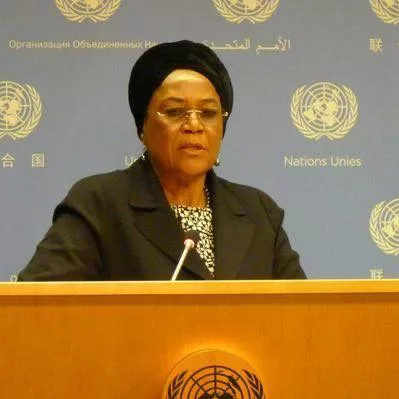
Prof. Joy Uche Angela Ogwu, a trailblazing scholar, diplomat, and former Minister of Foreign Affairs, is dead. She died at 79.
Family sources who confirmed her passing to NTA news in a phone conversation in Asaba said she breathed her last in the early hours of Monday at a hospital in New York, United States, with her daughter by her side.
Her death closes a chapter in Nigerian diplomacy that few have written with as much distinction.
Born August 22, 1946, in Delta State, Prof. Ogwu’s career was marked by many “firsts.”
She was the first woman from Nigeria to be appointed Permanent Representative to the United Nations, serving in that capacity from 2008 to 2017.
Prior to that, she held the post of Minister of Foreign Affairs between August 2006 and May 2007 under President Olusegun Obasanjo.
Her rise to prominence began in academia and policy research.
She earned her BA and MA in Political Science from Rutgers University, USA, and later a Ph.D. in Political Science from the University of Lagos in 1977.
She carved out a reputation as an expert in international affairs, disarmament, and Nigeria’s foreign policy, serving as Director-General of the Nigerian Institute of International Affairs (NIIA) before entering ministerial office.
At the United Nations, she twice presided over the UN Security Council in July 2010 and October 2011, representing Nigeria with influence on global security discourse.
She was also involved in leadership roles within international women’s rights organizations, including serving as President of the Executive Board of UN Women, and chaired the Board of Trustees of the United Nations Institute for Disarmament Research (UNIDIR).
Her scholarly works, such as Nigerian Foreign Policy: Alternative Futures (1986), remain key reference points in Nigeria’s foreign relations discourse.
Across her diplomatic career, she was an advocate for stronger South-South cooperation, promoting ties between Africa and Latin America, and was a voice for gender equity and human rights in global fora.
Prof. Ogwu was widely admired not only for her intellectual rigour but for her steadiness in moments when diplomacy required both courage and tact.
Her passing has prompted reflections across Nigeria’s diplomatic corps, academia, and among policy circles about the void her departure leaves.
 Premium News
Premium News